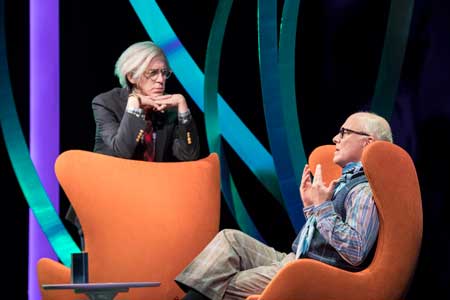Play
A Non-Fiction Invention
From the words of Truman Capote and Andy Warhol
Adapted by Bob Roth
Directed by Michael Mayer
American Repertory Theater
Loeb Drama Center
Harvard University, Harvard Square, Cambridge, MA
September 10 – October 13, 2017
With Stephen Spinella (Andy Warhol), Dan Butler (Truman Capote)

Dan Butler as Truman Capote
in “WARHOLCAPOTE”
Photo: Gretjen Helene Photography
Courtesy of American Repertory Theater
Dubbing this a non-fiction invention, adaptor/playwright Bob Roth indicates both that the source of the comments, dialogues and interactions between these two witty, weird, interesting contemporary artistic personalities is historic while the concoction of how they figure into the relationship is, to some extent, contrived. Writing plays based on letters or recorded dialogue is nothing new but it is given a sweet and delightful touch here, largely due to the finesse of the production and its two stars.
Roth’s work is drawn from a series of tapes Andy Warhol made of conversations he and Truman Capote had in 1978 with the thought that they might form the basis for a Broadway play. That play never got written and the tapes, along with many others Warhol made, went into the archives at the Warhol Museum in Pittsburgh where, after appealing to the Andy Warhol Foundation, Roth was able to access them and develop the current work.
These two characters are definitely unusual and they speak with such distinctive mannerisms that one might easily laugh if it were not in some way so seductive. Both stars, Stephen Spinella (Andy Warhol) and Dan Butler (Truman Capote), give histrionic, but deeply appealing, shapes to their characters’ enunciations. Even when they blather on about Studio 54 and how wonderful it is, they mutually exhibit a curiously odd, vulnerable weird warmth that makes one take sympathetically receive the messages carried through the medium of these bizarrely affected accents.
The oddity of the play is that though it really doesn’t go much of anywhere, that does not get in the way of conveying its peculiar charms. In the end one does get a window into Capote’s anxiety about writing and into Warhol’s cloying agreeableness, which seems to be the level to which this composite dialogue digs. Not too deep, but interesting, the show gives an intriguing sense of the relationship between these two distinctive beings whose recitation of opinions is consistently languorous. Acute insights come forth through voices seemingly infused by iron-poor blood. Both character wander and lilt in their speech, pulling it slowly and earnestly like taffy from their tongues. Even when the subject is sexuality, the tones are still the same. Capote goes on about his homosexuality while Warhol alludes to his own lack of sexuality, but both do it in a way that sounds much like they were discussing Studio 54 or anything else, with mischievously elongated inadvertent drawls.
How interesting it is to learn that, early on, Warhol relentlessly pursued a friendship with Capote, whom he regarded as magnetic and magnificent, through daily letters. Even though the weirdly offhand topics about celebrities and society that permeate the taped conversations cover up much of that sense of this original connection between the more established writer and the young artist, it was really writing and art that established that initial connection and maintained it for years afterwards.
In addition to hearing about Studio 54, one hears a lot throughout about Jackie Kennedy, Marilyn Monroe and other celebrities. The play is a lurid fun-fest in that sense, and also a reflection on the way in which these two artists, whose work deliberated and made its impact on the edges of popular culture, engaged with that world as it manifested itself in myriad ways in the mid-twentieth century.
Spinella and Butler are both great. This is not a monumental play, but it is a convincing and compelling one and the two actors make it so. A lot of very vivid projections by Darrel Maloney and two very pink chairs as part of the spare but affecting scenic design by Stanley A. Meyer stir up one’s sensibilities as this light drama unfolds, enabling the colorful discussion to have a series of attached visual emblems.
This production has the earmarks of going to Broadway, as do, on a regular basis, some percentage of the Diane Paulus outings at the ART. Spinella starred in the Broadway production of Angels in America twenty-four years ago and it’s likely he’s headed that way again for this intriguing but considerably less weighty offering.
– BADMan
Leave a Reply